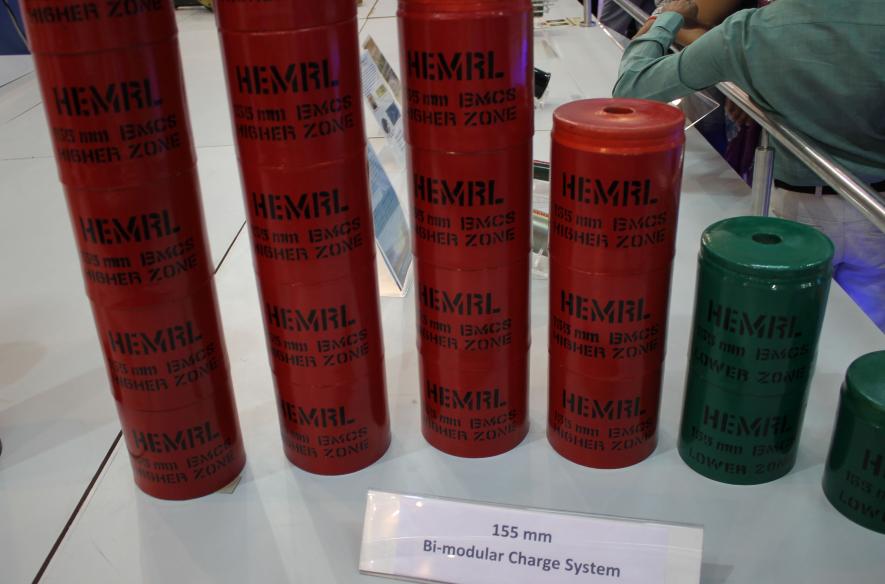Move to Transfer Military Ammunition Technology to Private Vendors Stirs Controversy

The All India Defence Employees Federation (AIDEF) has written to the Defence Minister Arun Jaitley, condemning the move to transfer the technology to manufacture the Bi-Modular Charge System (BMCS) to private vendors.
The BMCS is the ammunition system used in artillery weapons to ignite the shell and push it out of the gun. The 155 mm Howitzer Guns form a crucial part of the Indian Army’s artillery, and these howitzers may use ammunition such as BMCS, M4A2, Charge-8 and Charge-9 for achieving different ranges as per requirement. The Indian Army prefers to use BMCS for most of its requirements.
The Ordnance Factory Board (OFB) had received the technology to manufacture BMCS from the South African company Somchem. But its parent company Denel was entangled in a corruption scandal, and in April 2005, the company was debarred. Following this, the contract was cancelled.
The OFB had already paid the technology fee to Somchem and the latter had delivered the technology papers to OFB.
Subsequently, the Israeli Military Industry (IMI) was chosen to supply, build and commission the BMCS plant as per the technology documents provided by Denel. But IMI was also blacklisted in March 2012 for 10 years, again because the company was involved in corruption.
The Ordnance Factory at Nalanda, Bihar, had been chosen to implement the technology through global outsourcing of plant and machinery, but the process suffered a setback due to the blacklisting of IMI which was to be the implementation agency.
In spite of the stalemate, the OFB decided to start production of BMCS. The High Energy Material Research Laboratory (HEMRL) of the Defence Research and Development Organisation (DRDO) was roped in to render assistance wherever required and for “validation of implementation of the chemical formulations at different stages”.
Thus the HEMRL, having accessed full knowledge of the technology from Denel, developed its own variant of BMCS, jointly with the OFB.
But now the HEMRL is now going to “offer the technology to some private vendors in the name of resource/revenue generation”, said the AIDEF.
“It may be noted that at every stage, HEMRL has received material and technological support from O.F. Board units for their propellant related research and experimentation including so-called new variant of BMCS projected by HEMRL.”
The Federation objected to such “clandestine passing on” of “chemical formulation and technological knowledge acquired through years of association with O.F. Board in any repackaged form to private vendors in the name of resource generation”.
The move not only goes against the interests of the OFB, but also constitutes a violation of Intellectual Property Rights of Denel and is a clear breach of the OFB’s trust, said the Federation’s letter. Such “one-sided policy” adopted by the DRDO in the name of internal resource generation shows a misplaced notion of economic viability of Research and Development.
The present policy on technology transfer does not cover explosives, and the move to transfer BMCS technology to private vendors is therefore against the scope of the policy, said the letter.
The Federation said that the HEMRL was going to organise an event to facilitate the transfer of technology to private vendors, and the programme was going to be presided over by the Defence Minister or the Minister of State for Defence. The Minister’s presence would effectively grant a seal of approval to the technology transfer, said the letter signed by C Srikumar, General Secretary of the Federation.
However, after the AIDEF shot off the letter, the above-mentioned event subsequently did not take place, Srikumar told Newsclick. The reasons for this were not immediately clear.
The Transfer of Technology to private vendors would amount to taking away of products which the employees of the OFB have struggled to develop.
It has been reported earlier that Solar Industries, a Nagpur-based private company, is set to be the first private sector company to manufacture BMCS. In January 2017, the CFO of Solar Industries was quoted as saying that the company has signed a Memorandum of Understanding with the Government of Maharashtra to install facilities to produce BMCS.
The Federation appealed to the Defence Minister to halt the “controversial and illegal Transfer of Technology to private parties” at the cost of the OFB employees.
Get the latest reports & analysis with people's perspective on Protests, movements & deep analytical videos, discussions of the current affairs in your Telegram app. Subscribe to NewsClick's Telegram channel & get Real-Time updates on stories, as they get published on our website.
























